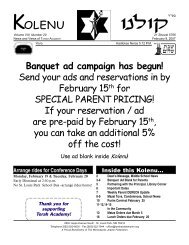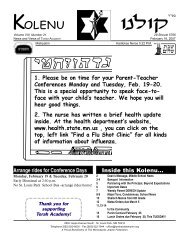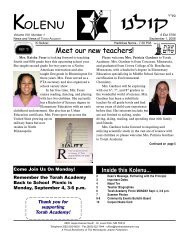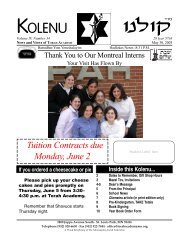February 17, 2006 - Torah Academy of Minneapolis
February 17, 2006 - Torah Academy of Minneapolis
February 17, 2006 - Torah Academy of Minneapolis
You also want an ePaper? Increase the reach of your titles
YUMPU automatically turns print PDFs into web optimized ePapers that Google loves.
KOLENU<br />
NEWS AND VIEWS OF TORAH ACADEMY<br />
Volume VII, Number 21 <strong>February</strong> <strong>17</strong>, <strong>2006</strong><br />
Dean’s Message<br />
Parent Teacher Conference Tips<br />
Oh, that favorite time <strong>of</strong> year…conference time.<br />
Indeed, conferences can be “the good, the bad and the<br />
ugly.” Parent-teacher conferences are an important part <strong>of</strong><br />
the schooling process. They give the parent and the<br />
teacher an opportunity to discuss a child in whom they<br />
have a mutual interest.<br />
Such conferences are most helpful when both the<br />
teacher and parents participate actively. The teacher is<br />
not there to put parents on the spot, but rather to make<br />
your child’s school experience a positive one. Just as<br />
teachers must prepare for conferences, so should parents.<br />
Here are a few tips to help<br />
ensure that your parentteacher<br />
conferences benefit<br />
all participants:<br />
1. Talk to your child<br />
before the conference. Ask<br />
your child what she would<br />
like you to discuss at the<br />
meeting. One strategy is to<br />
say, “I’m going to be meeting<br />
with your teacher; what will<br />
she tell me?” Your child’s<br />
response will give you ideas<br />
about what to discuss with the<br />
teacher. If your child<br />
responds, for example, that<br />
the teacher will say she is terrible in math, or that she<br />
talks all day long, then you should address these issues in<br />
the meeting.<br />
2. Ask questions. Come to the conference with a list<br />
<strong>of</strong> questions regarding your child’s academic and social<br />
issues, as well as questions about the teacher’s<br />
philosophy. Some good questions to ask may include:<br />
• What are my child’s strongest and weakest<br />
subjects?<br />
• What can I do from home to extend my child’s<br />
learning at home?<br />
• Is my child working up to his or her ability? If not,<br />
what can we do to change that?<br />
• How well does my child get along with classmates?<br />
• How do you evaluate my child?<br />
• How can you challenge my student if he is<br />
excelling? How can you support my child if he is falling<br />
behind?<br />
4<br />
• What is your homework policy?<br />
3. Share information about your child. Teachers need<br />
your help as they educate your children. And no one<br />
knows your child better than you do. Bring sample work<br />
to the conference that you’d like to discuss, or if it’s an<br />
early-in-the-year conference, bring work from last school<br />
year. The more you share about your child—both her<br />
strengths and weaknesses—the better the teacher will<br />
successfully meet her needs.<br />
4. Raise issues <strong>of</strong> concern. Plan ahead <strong>of</strong> time how<br />
you will raise issues <strong>of</strong> concern. When expressing<br />
concerns be tactful, but not so<br />
much that you don’t<br />
communicate the problem<br />
clearly. Listen to what the<br />
teacher has to say in response<br />
to the problem. Then work<br />
together to find a solution.<br />
5. Take notes. Take notes<br />
during the conference so that<br />
you remember everything the<br />
teacher says. After the<br />
meeting, review your notes. If<br />
something is unclear, schedule<br />
a follow-up meeting with the<br />
teacher to clarify.<br />
6. Make the most <strong>of</strong> your<br />
time. Conferences are scheduled for fifteen minutes.<br />
Make the most <strong>of</strong> your meeting by arriving on time. Try<br />
not to bring babies or young children to the meeting as<br />
they can cause distractions.<br />
7. Don’t hesitate to ask questions or say “I don’t<br />
understand.”<br />
8. Avoid statements such as “He seems lazy” or “He’s<br />
very bright.” Instead, describe the specific behavior that<br />
led you to those conclusions.<br />
9. If the teacher should make judgmental statements,<br />
ask for an example <strong>of</strong> a situation that illustrates the point<br />
so you might better understand it.<br />
10. Before concluding the meeting, find out how you<br />
can best reach the teacher if you have questions.<br />
Gut Shabbos, a Shabbat Shalom<br />
Rabbi S. Binyomin Ginsberg<br />
<strong>Torah</strong> Umesorah ~2004~ School <strong>of</strong> the Year
















